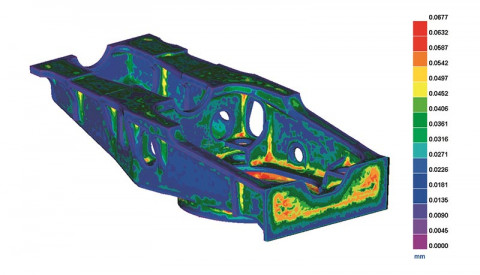ESI Releases its Casting Simulation Suite 2010
ESI has developed over the years a set of applications for the foundry industry to optimize processes and to improve part quality. ESI’s Casting Simulation Suite (including ProCAST & QuikCAST) allows predictive evaluations of the entire casting process including: filling and solidification defects; mechanical properties; and, complex part distortion. It enables rapid visualization of the results of casting and thus allows correct decision-making at an early stage in the design of a manufacturing process.

Good correlation of the microstructure between simulation and real part. This prediction then defines the final mechanical properties of the component (frame of a wind turbine generator in cast iron). Image courtesy of Tecnalia.
The new 2010 version delivers numerous enhancements; offering several improved product functionalities as well as new features that meet today’s foundry needs. ESI’s Casting Simulation Suite 2010 allows an engineer to build step-by-step the necessary functionalities to span the entire foundry process – from die design through to the component’s performance during its productive life. In this release, ESI introduces important developments in micro modeling, allowing the prediction of the microstructure and assessment of the consequent mechanical properties of ferrous and non-ferrous alloy, both as cast and after heat treatment. This major technological breakthrough has led, for instance, to the precise selection of heat treatment parameters in order to obtain the required properties for Austempered Ductile Iron (ADI) components. Using this capability, ADI can be engineered to have properties superior to commonly used alloys, such as steel, as it is lighter and stronger for the same applications. Simulation helps achieve this performance, providing new materials opportunities to the transportation industry.
"ProCAST recent developments prove to be excellent for predicting the microstructure and the basic mechanical properties of casting materials,” said Dr. Antton Meléndez Arranz, Metallurgist at Tecnalia. “Using the microstructure module, the simulation of local graphite expansion is possible with a sensitively higher accuracy for shrinkage defects prediction. The microstructure module opens up a new line of possibilities and makes other types of analyses possible, particularly in relation to metallurgical quality level adjustments, according to the inoculation parameters in simulation."
Also included in version 2010 is a new optimization module. With only one simulation, engineers must set the best conditions for the design or process to reach objectives, such as minimizing porosity or improving yield. Using the new optimization module several simulations of the same process are run automatically, with slight variations of the input parameters (as happens on the foundry shop floor). Robustness and part quality are quantified from the simulation results.
The Casting Simulation Suite includes solutions and enhancements in gas porosity predictions, pin squeeze, air entrainment, thermal modulus and also for results extraction. The overall performance has been significantly improved.
“When you have the right tool in your hands, you can easily get quick and optimal solutions arising from extremely complex problems in superalloy foundries. ESI’s software has the potential to do this,” declared Ciro Caramiello, PhD - Process Modelling at EMA Rolls-Royce.
"We are pleased to announce the release of our Casting Simulation Suite 2010,” said Marco Aloe, Casting Product Manager at ESI Group. “Our growing and faithful installed base demonstrates the relevancy of our solution for foundries, whether they require a quick estimate or a more advanced and complete diagnosis. Our goal remains to develop tailored tools to help foundries efficiently design the best quality part and meet performance criteria. Included in version 2010 are developments in microstructure, stress, optimization and interfaces to specifically meet our customers’ challenges."
For more information, please visit: www.esi-group.com/products/casting